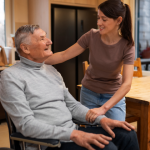Meditation for Seniors: How to Begin and the Benefits
Meditation is commonly regarded as a hobby for young, busy professionals and spiritual seekers, but it also offers valuable benefits for older adults. Indeed, meditation for seniors is becoming more popular as an exciting way to promote mental clarity, emotional health, and physical relaxation. This blog focuses on how older adults begin meditating, benefits of meditation for seniors, and useful techniques to improve their everyday lives.
How to Begin Meditating for Seniors
Starting to meditate may seem overwhelming for seniors at first, but with a good approach it can be an easy and enjoyable way to practice! Here are some simple detailed steps older adults can take to get started on meditation:
- Find a Comfortable Environment
Begin by finding a quiet, comfortable space with minimal distractions. This may be a particular corner of the living room, a reclining rocking chair, or even a space in the garden. Make sure the area is peaceful and familiar, with soft lighting and minimal noise interruption. - Set a Time
Part of the value of meditating is to practice consistently. If you’re going to start meditating, begin with 5-10 minutes a day and slowly extend as confidence in the practice develops. The morning or before bed are generally great times to meditate. - Focus on breath
One of the simplest forms of meditation is solely focusing on breath. A senior can breathe in deeply through their nose, hold for a few seconds, and then slowly breathe out. This focuses the mind on calming down and helps to relieve stress or upset thoughts. - Try guided meditations
Guided meditations are great for seniors who are new to the practice. Most mediation apps or online sources have a guide or a voice to follow. Anything with specific step by step instructions will be smoother and make the senior feel more comfortable with meditating. - Patience
Like anything else, meditation requires time and practice to be effective. It is completely normal for the mind to wander (this is particularly true at the beginning) so remind seniors to be patient with themselves and not give up!

Benefits of Meditation for the Elderly
The benefits of meditation for the elderly are profound, spanning both mental and physical health. Here are just a few of the many advantages:
| Benefit | Description |
| Reduces Stress and Anxiety | Meditation helps seniors manage stress by calming the nervous system and promoting a sense of relaxation and peace. |
| Improves Sleep Quality | Regular meditation can improve sleep quality by calming the mind and reducing racing thoughts, helping seniors fall asleep more easily. |
| Boosts Memory and Focus | Meditation can increase brain plasticity, which helps seniors enhance memory retention, cognitive function, and mental clarity. |
| Improves Emotional Well-being | Mindfulness for elderly individuals helps boost their mood by encouraging positive thinking and emotional resilience. |
| Promotes Physical Relaxation | Relaxation exercises for seniors, such as body scans and mindful breathing, reduce muscle tension and promote overall physical relaxation. |
| Improves Heart Health | Meditation has been linked to lower blood pressure, improved circulation, and reduced risk of heart disease, all of which benefit seniors’ health. |
Meditation Practices for Seniors
There are so many different types of meditation practices; seniors can try different types of meditation practices to find what works for them. Some common practices include:
- Mindful breathing
Mindful breathing is likely one of the easiest and most basic meditation practices. The senior can sit comfortably and simply focus on their breath, focusing primarily on inhales and exhales. Mindful breathing can help create mindfulness and allow the senior to develop mindfulness of their own body and thoughts. - Progressive muscle relaxation
This involves tensing and relaxing muscle groups throughout the body to release stress and tension. Progressive muscle relaxation is a great practice for seniors with any physical discomfort or symptoms due to stress. The practice can allow seniors to deeply unwind and feel more comfortable. - Loving-Kindness Meditation (Metta)
This meditation concentrates on generating feelings of love and compassion for oneself and others. Seniors may envision sending love and benevolence to their loved ones, friends or even a stranger creating a positive like-minded mental atmosphere. - Guided Imagery
Guided imagery is when one focuses on some pleasant and peaceful mental images. Consider a senior imagining they are walking through a forest, relaxing at the beach, or sitting in a serene garden. This is a pleasant and quite helpful way to promote inner peace.
Senior Meditation Classes: A Great Way to Begin
Many communities and wellness centers offer senior meditation classes. These classes are tailored specifically for seniors and modifications are made based on physical limits. These classes offer an organized and supportive environment to practice mindfulness.
Working together in a group format, foster a sense of connection and community that can help with feelings of isolation in older adults. Senior meditation classes often have a variety of meditation styles and breathing/relaxation techniques that can be practiced or experienced.
The Value of Meditation and Seniors
Meditation is a helpful, powerful, and simple practice that offers countless physical, emotional, and mental benefits for seniors. Whether to improve sleep patterns, lessen tension, or improve cognitive function; meditation can be a helpful, simple tool to maintain health and well-being as you age. Beginning with a few minutes each day and practicing with multiple methods, seniors can lead a more peaceful, calm, and focused life.
If you are searching for a home care agency for yourself or a loved one, the HHA unit of Angel Care is here to help. Please don’t hesitate to reach out to us today for a consultation.

Caring for a loved one is a heartfelt demonstration of love and commitment. However, this noble endeavor often brings about significant physical and emotional challenges. If these challenges remain unaddressed, they can lead to complete exhaustion. Preventing caregiver burnout is not merely a suggestion — it is a vital step in maintaining emotional stability and ensuring the highest quality of care. In this article, we will delve into practical and insightful strategies for caregiver stress management, highlight key warning signs, and provide effective tools to restore balance in your life. Understanding Caregiver Burnout: What It Is and Why It Matters Caregiver burnout is characterized by a state of physical, mental, and emotional fatigue that arises from prolonged stress and insufficient respite. Family caregivers, in particular, are at risk, often neglecting their own needs in favor of others. Common signs of caregiver burnout include: Persistent fatigue, even after adequate rest Increased irritability, frequent crying, or feelings of guilt A noticeable decline in motivation or interest in previously enjoyable activities Physical symptoms like headaches, muscle tension, and disruptions in sleep Feelings of isolation and loneliness, even when surrounded by others "Burnout is not a weakness — it’s your body and mind’s way of saying you’ve cared for others while forgetting yourself." — Angel Care Inc. NY The Consequences of Ignoring Caregiver Stress Understanding caregiver health and wellness tips is crucial not only for your own well-being but also for the health of those you care for. When caregivers become overwhelmed and emotionally drained, the risks of mistakes increase, relationships can suffer, and the quality of care provided may decline. If left unchecked, caregiver stress can lead to: Worsening of chronic health conditions Heightened risk of depression and anxiety Decreased attention and compassion in caregiving A pervasive sense of failure or a desire to give up Practical Tips to Avoid Caregiver Burnout Implementing caregiver self-care strategies is essential for sustaining your well-being. Here are some effective recommendations to help you navigate the challenges of caregiving: Set Clear Boundaries: Learn to say “no” when necessary. Acknowledge that you cannot do everything, and that’s perfectly acceptable. Delegate Responsibilities: Seek help from friends or family. Even a brief respite can lead to significant rejuvenation. Take Scheduled Breaks: Allocate 15–30 minutes daily for silence and rest to reset your mind and spirit. Prioritize Physical Health: Focus on: Getting 7–8 hours of sleep per night Consuming balanced meals Engaging in light exercise, such as yoga or walking Maintain Social Connections: Participate in support groups or connect with friends for emotional support, which is crucial for stressed caregivers. Practice Mindfulness: Incorporate breathing exercises, journaling, and meditation into your routine to alleviate mental overload. Managing Caregiver Mental Health: Building Emotional Resilience To effectively manage caregiver mental health, cultivate emotional awareness and engage in personal reflection. Consider the following: Let go of guilt associated with feelings of frustration. Discuss your experiences openly with a therapist, friend, or support group. Accept your limitations and recognize that perfection is not a requirement. Carve out time for joy through movies, books, hobbies, or simply enjoying a quiet cup of tea. "The best thing you can do for your loved one is not to lose yourself in the process of caring for them." — Angel Care Inc. NY Support Systems for Family Caregivers Remember, you do not have to face caregiving challenges alone. Angel Care Inc. NY offers: Individual consultations for personalized home care planning Access to qualified home care professionals Educational resources aimed at preventing family caregiver exhaustion Respite care services to ensure you can rest and recharge Caregiver Wellness Plan: Build Your Personal Balance Strategy Create your own caregiver wellness roadmap: Wellness Area Actions to Take Emotional health Talk, journal, connect with a therapist Physical well-being Sleep, eat well, stay active Social engagement Stay in touch with friends, join a group External support Use Angel Care services, ask for help You Matter Too Preventing burnout is the key to sustainable caregiving, personal fulfillment, and self-respect. As emphasized by Angel Care Inc. NY, caring for yourself is integral to providing excellent care for those you love. "Compassionate caregiving begins with compassion for the caregiver." If you find yourself feeling overwhelmed or nearing your emotional limits, remember — you are not alone. Reach out to Angel Care Inc. NY for the support you need, enabling you to continue offering care to those who matter most to you.

Designing a living space that accommodates the needs of seniors is an essential step in promoting successful aging in place. At Angel Care Inc. in New York, we fully understand the critical role home safety plays in the lives of older adults, particularly when it comes to fall prevention and maintaining their independence. In this article, we present a comprehensive guide filled with practical strategies to enhance home safety for seniors, along with essential modifications and tips to ensure older individuals can live in their homes safely and autonomously. The Significance of Senior Home Safety As individuals age, the likelihood of accidents and injuries increases, particularly within the home. The Centers for Disease Control and Prevention (CDC) reports that one in four seniors experiences a fall annually, with many of these incidents leading to severe injuries. This makes it crucial to focus on elderly fall prevention at home and implement necessary adaptations in various areas to reduce the risk of falls. Senior proofing a home goes beyond simple fixes; it involves transforming the environment to provide a safe, secure, and supportive space that fosters independence while safeguarding the well-being of its residents. Senior Home Safety Modifications: Essential Tips Here are some senior home safety modifications that can help reduce fall risks and improve safety for older adults: Home Modification How It Enhances Safety Install Grab Bars in Bathrooms Grab bars help seniors maintain balance when getting in and out of the shower or bath, preventing slips. Add Non-Slip Rugs and Mats Using non-slip rugs or mats in high-traffic areas (especially bathrooms and kitchens) reduces the risk of tripping. Improve Lighting Bright, even lighting reduces shadows and prevents tripping hazards. Install nightlights in hallways, bathrooms, and stairs. Use Raised Toilet Seats Raised toilet seats make it easier for seniors to sit and stand, reducing strain and the risk of falls. Install Stair Railings Secure railings on both sides of stairs provide additional support and stability, reducing the risk of falling. Create Clear Pathways Keep walkways and corridors free from clutter. Clear paths ensure easy mobility and reduce tripping hazards. Minimizing Fall Risks for Seniors at Home Falls present a significant concern for seniors, making elderly fall prevention a top priority in the home. To effectively reduce the risk of falls, consider the following strategies: Eliminate Tripping Hazards: Keep the floor clear of clutter and ensure that loose cables and cords are properly secured. Furniture and rugs should be placed in a way that avoids obstructing pathways. Choose Proper Footwear: Seniors should wear non-slip, supportive shoes inside the home, avoiding slippery socks or sandals that could cause a fall. Review Medications: Some medications can affect balance or cause dizziness, increasing the risk of falls. Seniors should regularly consult their healthcare provider to review medications and manage any side effects that may heighten fall risks. Invest in a Medical Alert System: While taking safety precautions is important, the peace of mind provided by a personal emergency response system (PERS) is invaluable. With the simple press of a button, seniors can summon help from emergency responders in the event of a fall. Safety Devices for Seniors Alongside home modifications, integrating essential safety devices can greatly enhance overall home safety. Key devices to consider include: Fall Detection Sensors: Wearable devices that detect falls and notify caregivers or emergency services, ensuring help is on the way. Smoke and Carbon Monoxide Alarms: Install alarms on every level of the home, particularly outside sleeping areas. Regularly test alarms to ensure they are functioning properly. Medical Alert Systems: Simple devices that allow seniors to call for help at home or in their yard. Smart Home Devices: Integration with devices like Amazon Alexa or Google Home allows seniors to control lighting, adjust temperature, and receive medication reminders, promoting safety and convenience, especially for those with mobility challenges. Motion-Sensing Lights: These lights automatically activate when someone enters a room or hallway, providing illumination without the need to find light switches. Creating a Safe Living Space for Seniors Ensuring a safe living space goes beyond structural adjustments; it involves fostering an environment that promotes safety and independence. Here are a few additional safety tips for seniors: Establish a Routine: A structured daily routine can help seniors navigate daily tasks more easily, reducing the physical and mental strain of decision-making and time management. Encourage Socialization: Seniors living alone may experience isolation, which can impact both their physical and mental health. Regular interaction with caregivers, family, and friends helps maintain normalcy and emotional well-being. Daily Check-ins: Whether through a phone call, video chat, or in-person visit, daily check-ins provide emotional support and offer an opportunity to address potential safety concerns. The Importance of Senior Home Safety Modifications At Angel Care Inc., we understand that making a home safe for seniors is a process that requires careful consideration and effort. We are committed to providing guidance on senior home safety modifications to help minimize fall risks and create an environment where seniors can feel safe, confident, and independent. Creating home adaptations that prioritize elderly safety is essential for the well-being of seniors and offers peace of mind to their families. If you or a loved one require assistance with senior home safety modifications or the installation of safety devices, don’t hesitate to reach out to HHA Angel Care Inc. Our team of trained professionals is here to help you ensure the comfort and safety of your loved ones. "A safe home is not only minimizing risks, it is enhancing quality of life for seniors!" — Angel Care Inc. NY



